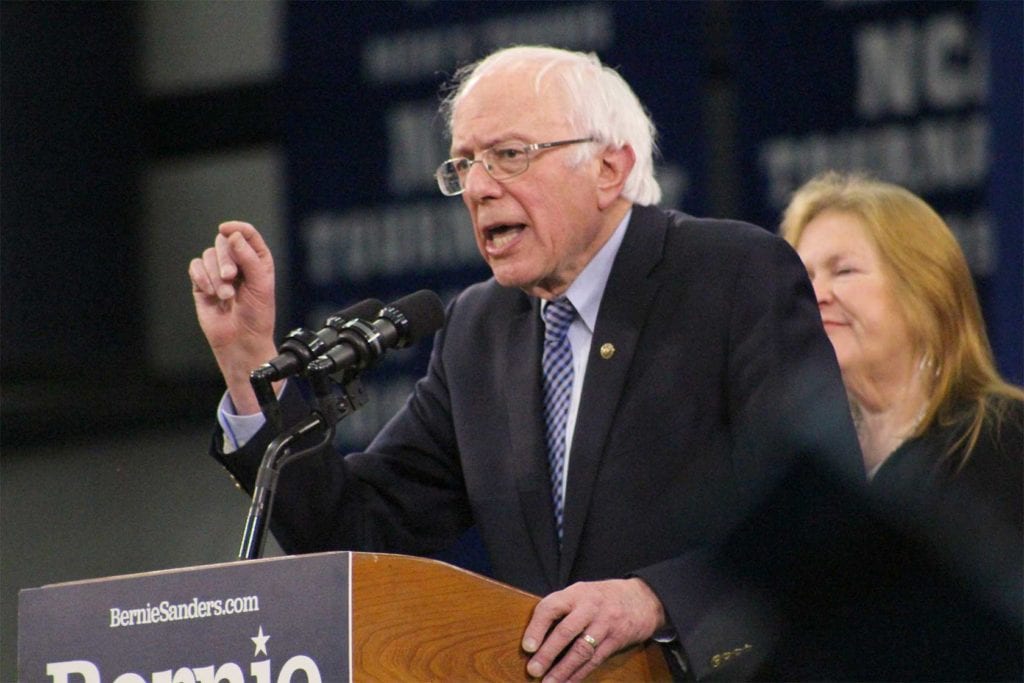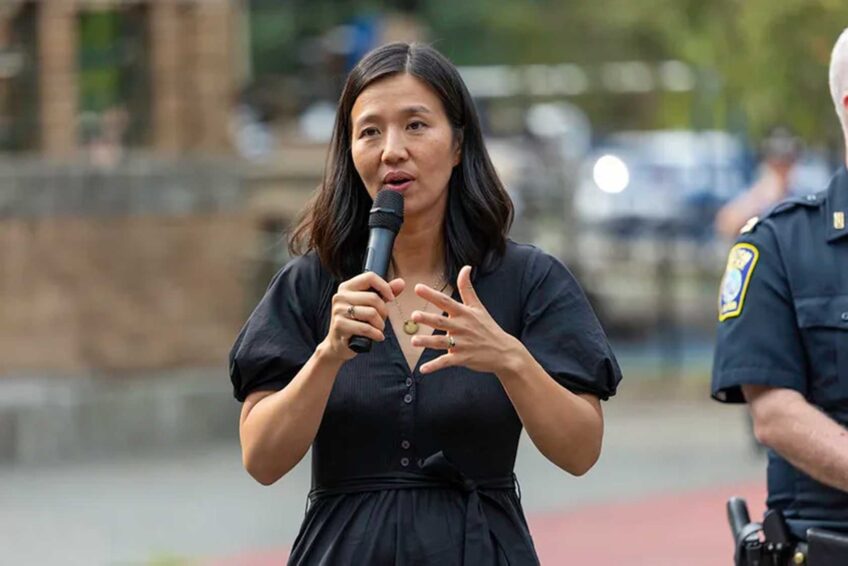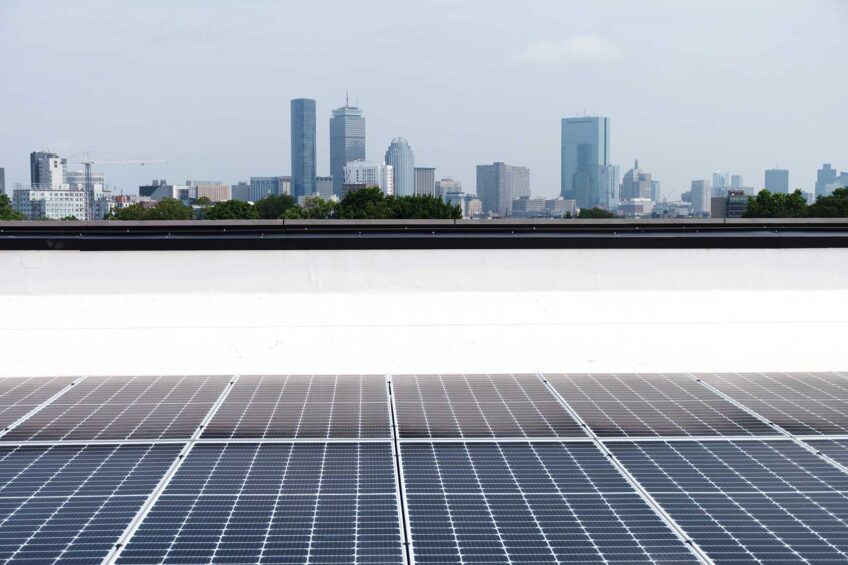Black vote looms large in primary
Candidates need black support to win delegates in Democratic contest

After early-voting contests in the cornfields of Iowa and the snows of New Hampshire, the 2020 Democratic primary race now turns to states where black voters could decide who will carry the party banner into the November showdown with President Donald J. Trump.
Over 60% of the Democratic primary voters in the critical Feb. 29 race in South Carolina are African American. Blacks and Latinos make up about a third of the voters in the Feb. 22 Nevada caucuses this coming Saturday. During Super Tuesday balloting on March 3, black voters in states like California, Texas, Alabama, Virginia and even Massachusetts, will have an outsized influence on who emerges as the likely nominee.

Massachusetts Sen. Elizabeth Warren takes selfies with supporters outside of the Webster Elementary School in Manchester, New Hampshire. PHOTO: ALEXA GAGOSZ
Candidates are accordingly switching menus from the corndogs of the Iowa State Fair to the barbeques of the Palmetto State in a mad rush to convince the gumbo mix of voters they can carry the hope of denying a second term to the ex-reality-TV-personality now starring from the Oval Office.
“Communities of color will be crucial in the upcoming primaries, particularly in South Carolina,” said Melvin Poindexter, a Newton resident who is a 20-year member of the Massachusetts Democratic State Committee and the only African American among the four-member Bay State delegation to the Democratic National Committee. “How candidates do in South Carolina will dictate how much effort they put here in Massachusetts,” which, he noted, will send 114 delegates to the Democratic National Convention.
Headed to a disappointing fifth-place finish in New Hampshire on Feb. 11, former Vice President Joe Biden flew to South Carolina before sundown to shore up his sagging support among African Americans.
“We just heard from the first two of 50 states,” Biden said upon his arrival, as polls showed his share of the black vote nationally dropping from 51% to 27 %. “Not all the nation, not half the nation. Not a quarter of the nation, not 10%. Two. Where I come from, that’s the opening bell, not the closing bell. Up until now, we haven’t heard from the most committed constituents in the Democratic Party, the African American community, or the fastest-growing segment of society, the Latino community.”
Biden’s weakening hold on black support, based largely on his eight years of service as President Barack Obama’s number two, has led to rivals aggressively stepping in to further chip into what was seen as the vice president’s firewall.
Former New York City Mayor Michael Bloomberg, riding a tide of $350 million in TV advertising featuring glowing tributes from Obama, has leapfrogged Vermont Sen. Bernie Sanders in popularity among black voters, though Sanders, the self-described “Democratic Socialist,” has a 20-point lead among African Americans ages 18 to 34.
Like Bloomberg, entrepreneur Tom Steyer largely skipped Iowa and New Hampshire to focus on South Carolina and Super Tuesday states and is on the rise among voters of color, buoyed by a passionate message of economic and racial justice.
Former South Bend, Indiana Mayor Pete Buttigieg, who finished first in Iowa and second in New Hampshire to Sanders, has climbed from 0% polling among blacks to 4%, while Minnesota Sen. Amy Klobuchar still comes up goose-eggs, suggesting trouble for both Midwest moderates.
Meanwhile, Massachusetts Sen. Elizabeth Warren, who finished fourth in New Hampshire and polls around 10% among African Americans, is trying to regain the momentum that saw increasing numbers of minority voters responding to her detailed agenda for economic empowerment and unflinching denunciation of the criminal justice system as racist.
On Monday, U.S. Rep. Ayanna Pressley (D-Mass.), a co-chair of Warren’s campaign, rallied volunteers in Cambridge and Boston to work hard for her election.
“Elizabeth Warren is the starkest contrast to the equal-opportunity offender, abuser and narcissist-in-chief,” said Pressley. “Here’s a guy that wants to go it alone, that sows seeds of division that leads with chaos. And Elizabeth Warren is a woman, by contrast, who is about coalition, community and movement-building.”
The fluid dynamics of the contest going into Saturday’s Nevada caucuses, with no candidate holding a commanding grip on the nomination, leaves black voters as potential Democratic king-makers in the remaining races, especially the 14-state Super Tuesday showdown, when one-third of the delegates to the Democratic National Convention will be chosen.
“We’re now seeing voters of color, who are the backbone of the Democratic Party, particularly black women, flex their electoral muscle,” Bakari Sellers, a former South Carolina state legislator, told the Washington Post. “My mom and her friends will decide who the nominee is and who goes toe-to-toe against Donald Trump.”
Political operative and Boston Herald columnist Joyce Ferriabough said that competition for the black vote nationally is fierce, while here in the Bay State it appears to be a three-way race between Biden, Sanders and Warren.
“Biden should be high on that list by virtue of the fact that he was Obama’s vice president for eight years,” she said. “I do respect that Elizabeth Warren called out a racist justice system, and the fact that she has Ayanna Pressley in her camp will make a difference.”
Suffolk County Sheriff Steve Tompkins, who recently returned from campaigning for Warren in South Carolina, said voters there “are just getting to know all the candidates. As her surrogates cross the country and state and listen to what she’s going to do on racial justice, early child care, housing and education, I think people are going to stick with her.”
Former Cambridge Mayor Kenneth E. Reeves hosted a house party for Sanders in 2016 and expected 50 people. Over 100 showed up. He has seen the same excitement for the curmudgeonly independent this time as well. “The Bernie crowd is a very, very energized crew,” he said, citing a thirst to move beyond the moderate Democratic past and embrace the more radical change espoused by Sanders, whose 2016 calls for single-payer health care and a $15 minimum wage have become mainstream positions.
“I’ve become a different kind of Democrat,” said Reeves. “I’m not interested in the Clinton years or the Obama years. It’s hard for me to look at their combined 16 years in office and realize why we black people are not better off.”
Prominent publicist and social convener Colette Phillips said she started off the campaign season as a Biden backer, switched to Deval Patrick when the former governor jumped in, and now, with Patrick out, is looking closely at Bloomberg.
The ex-Gotham chief executive, a 78-year-old billionaire, deserves consideration because of his record of business accomplishment, his success in backing gun safety and climate-change campaigns around the country and his ability to stand up to Trump in ways she hasn’t seen from other candidates, said Phillips.
“It’s no coincidence Bloomberg is winning increasing black support,” she said. “He has the chops to take on Trump.” While Bloomberg is facing criticism over his stop-and-frisk policy in New York City as well as comments blaming the 2008 financial collapse on ending racial discrimination in lending, Phillips said every candidate has to face up to past statements and actions that may prove troubling to black voters.
“The redemptive power of change is something I firmly believe in,” said Phillips. “Michael Bloomberg apologized and I accept that. I do believe he may be the best candidate to take on Trump. As a person of color and a woman, I would vote for a ham sandwich if I thought it could beat the most dangerous person in the United States, who is President Donald Trump.”






